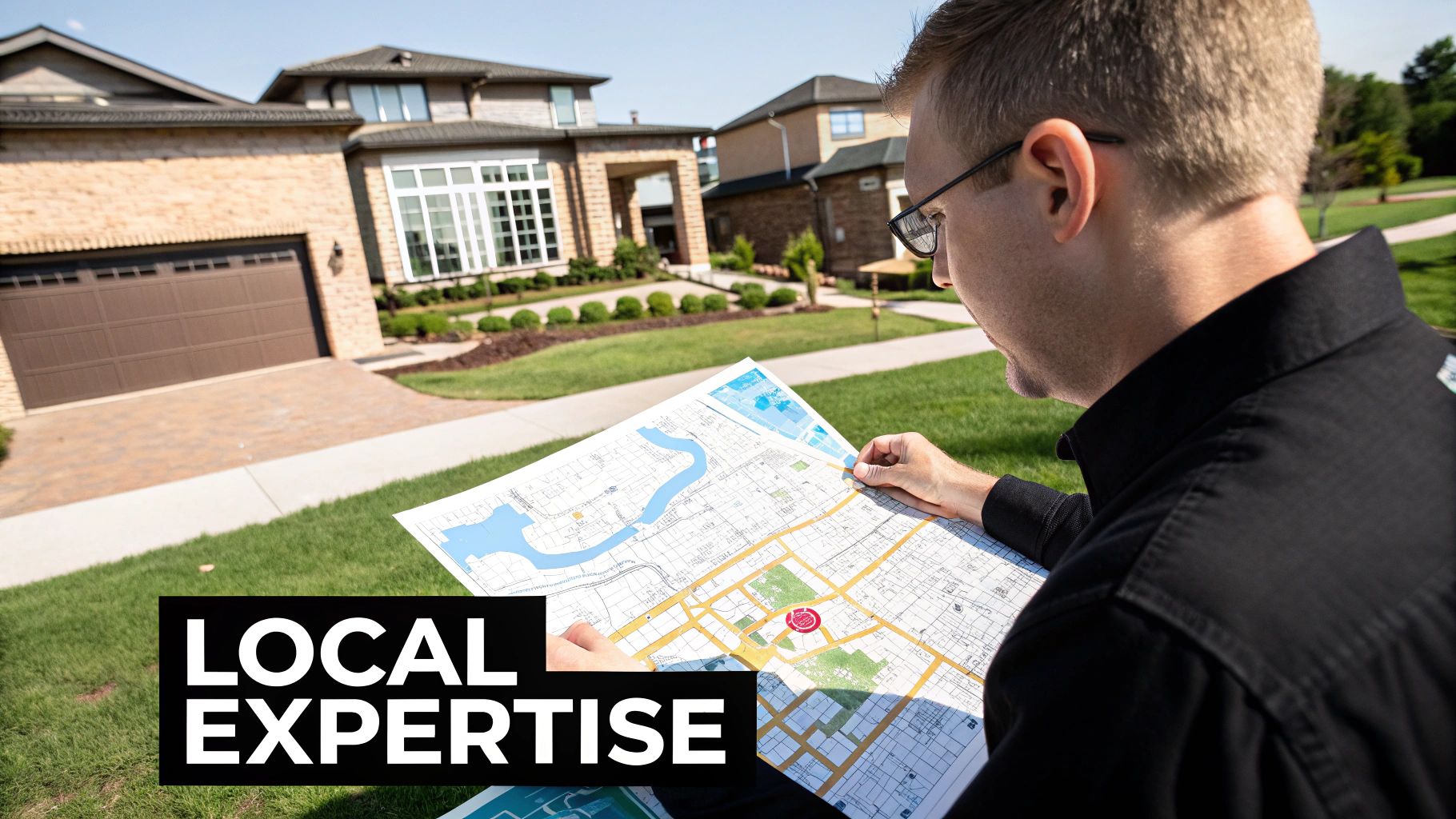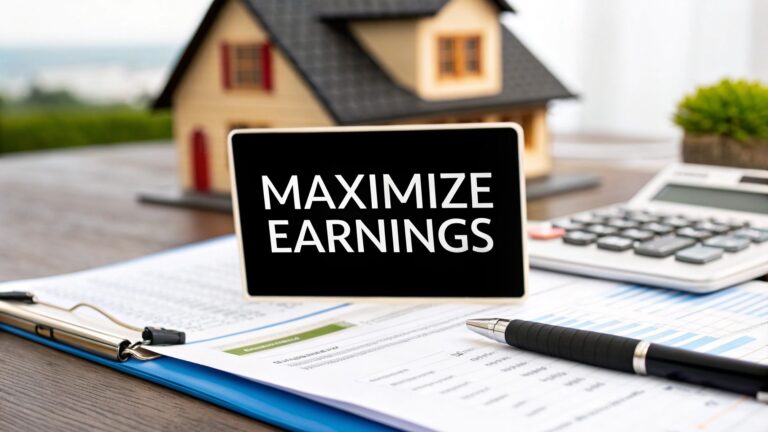8 Real Estate Agent Success Tips for 2025
Level Up Your Real Estate Game in 2025
Want to boost your commission earnings and achieve real estate success in 2025? This listicle delivers eight actionable real estate agent success tips to elevate your business. Whether you're a seasoned California realtor seeking innovative strategies or a newly licensed agent navigating the market, these tips will help you build a thriving practice. Learn how to strengthen your brand, generate leads, master communication, become a local expert, leverage technology, nurture your network, and refine your pricing strategies. We'll also cover the importance of ongoing professional development to stay competitive. These core strategies are crucial for maximizing your potential in today's real estate market.
1. Build a Strong Personal Brand and Online Presence
In the competitive California real estate market, standing out from the crowd is crucial for success. One of the most effective real estate agent success tips is to build a strong personal brand and cultivate a robust online presence. This involves creating a recognizable and consistent image, message, and value proposition across all marketing channels, both digital and traditional. A strong brand doesn't just make you memorable; it builds trust with potential clients, positions you as an expert, and ultimately drives more business. This is especially important for experienced agents seeking higher commissions, newly licensed associates needing mentorship, and those frustrated with traditional brokerage models. A strong brand helps you control your narrative and attract the clients you want.

Developing a strong personal brand requires a strategic approach encompassing several key features. First, establish a consistent visual identity across all platforms. This includes using the same logo, color palette, fonts, and imagery on your website, social media profiles, business cards, and marketing materials. This consistency reinforces your brand recognition. Next, define your clear value proposition and unique selling points. What makes you different? Are you the luxury home specialist in Beverly Hills? The first-time homebuyer expert in Oakland? Highlighting your expertise in specific markets or property types can attract a niche clientele and establish you as the go-to agent in that area.
Professional photography and marketing materials are also essential for projecting a polished and credible image. High-quality photos of your listings, professional headshots, and well-designed brochures all contribute to a positive first impression. Equally important is an active social media presence. Choose two or three platforms where your target audience is most active – perhaps Instagram for visual content, LinkedIn for professional networking, and Facebook for community engagement. Share valuable content regularly, including market insights, property listings, client testimonials, and behind-the-scenes glimpses of your work. Learn more about Build a Strong Personal Brand and Online Presence to enhance your social media strategy. Finally, a professional website with IDX integration is a must-have. Your website should be user-friendly, mobile-responsive, and showcase your listings, expertise, and client testimonials.
The benefits of building a strong personal brand are numerous. Increased recognition and memorability ensure that potential clients think of you first when they're ready to buy or sell. This brand recognition builds trust and credibility, crucial for winning clients in a competitive market. A well-defined brand also differentiates you from competitors, allowing you to stand out in a sea of real estate agents. Furthermore, a strong brand creates referral opportunities. Satisfied clients are more likely to recommend you to their network, leading to organic business growth.
While the advantages are clear, building a personal brand also has its challenges. It requires a significant time investment to create and maintain a consistent online presence. Developing professional marketing materials, creating engaging social media content, and managing your website all take time and effort. There can also be costs associated with professional photography, website design, and marketing campaigns. Moreover, building a strong brand doesn't happen overnight. It takes time and consistent effort to see tangible results.
Consider the examples of Ryan Serhant, who built a luxury real estate brand through reality TV and social media, or Barbara Corcoran, who transformed herself from a small broker into a national brand. Even local agents who become known as "the condo king of San Francisco" or "the Silicon Valley tech executive's realtor" demonstrate the power of niche branding. These success stories illustrate the potential of a strong personal brand in the real estate industry.
For actionable real estate agent success tips, start by choosing 2-3 social media platforms and commit to posting consistently. Invest in professional headshots and branded marketing materials. Share market insights and educational content regularly to position yourself as an expert. Respond to all online reviews professionally, demonstrating your commitment to client satisfaction. And always use the same colors, fonts, and messaging across all materials to reinforce your brand identity. For tech-savvy realtors and those seeking a more virtual model, a strong online brand is even more critical. It allows you to connect with clients, build relationships, and close deals in the digital space.
By focusing on building a strong personal brand and online presence, you can establish yourself as a trusted advisor, attract your ideal clients, and achieve long-term success in the California real estate market.
2. Master Lead Generation Through Multiple Channels
In the competitive California real estate market, relying on a single lead generation method is like betting everything on one horse. Successful real estate agents understand the power of diversification. They build robust lead generation systems that tap into multiple channels, ensuring a consistent flow of potential clients and minimizing dependence on any single source. This approach is crucial for real estate agent success tips, especially for those aiming for higher commission earnings.

A multi-channel lead generation strategy incorporates a blend of online and offline methods. This might include online marketing tactics like SEO optimization and social media campaigns targeting specific neighborhoods, coupled with traditional approaches like referrals from your sphere of influence, networking at local events, and even strategic cold calling or door knocking. For tech-savvy realtors craving a virtual model, paid advertising on platforms like Zillow, Facebook, and Google can be highly effective.
This diversified approach offers numerous benefits. It creates a more predictable and consistent pipeline of potential clients, reducing the feast-or-famine cycle that can plague agents relying on a single source. Furthermore, it mitigates risk from market fluctuations. If one lead source dries up due to changing market conditions or algorithm updates, others can continue to generate leads. Multiple touchpoints with potential clients through different channels also increase conversion rates, leading to more closed deals and higher commission earnings. This strategy is particularly valuable for newly licensed real estate associates looking for mentorship and training, as it provides a broader foundation for building a successful career.
However, managing multiple lead generation channels is not without its challenges. It requires significant upfront investment, both in terms of time and money. It can also be overwhelming to juggle various platforms and strategies, requiring careful organization and efficient systems. Optimizing each channel takes time and experimentation, demanding ongoing testing, analysis, and adjustment. Learn more about Master Lead Generation Through Multiple Channels](https://www.ashbygraffcareers.com/2025/05/26/real-estate-leads-for-new-agents/).
Utilizing a robust Customer Relationship Management (CRM) system is essential for tracking leads, automating follow-up sequences, and scoring leads based on their likelihood to convert. Features like automated email campaigns and personalized messaging help nurture leads and build relationships, crucial for agents prioritizing ethical integrity and community focus. Lead scoring and qualification processes help focus efforts on the most promising prospects, maximizing efficiency and return on investment (ROI). Regularly analyzing conversion tracking data and calculating the cost per lead for each channel are vital for identifying what's working and what needs adjustment.
Consider these actionable tips to effectively implement a multi-channel lead generation strategy:
- Start small: Begin with 2-3 lead sources and master them before expanding. This allows for focused learning and optimization.
- Track and measure: Diligently monitor your cost per lead and conversion rates for each channel. This data-driven approach will inform your decisions and help you allocate resources effectively.
- Automate and nurture: Leverage a CRM to automate follow-up and nurture sequences. Consistent communication is key to building relationships and converting leads.
- Invest wisely: Allocate a portion of your gross income (e.g., 20%) specifically for lead generation activities. This ensures consistent investment in your business growth.
- Test and optimize: Continuously test different messaging, offers, and targeting parameters to optimize conversion rates.
Examples of successful multi-channel lead generation include combining Zillow Premier Agent advertising with targeted sphere of influence marketing campaigns, utilizing Facebook and Google Ads to promote open house events in specific neighborhoods, and leveraging Inside Sales Associates (ISAs) for lead qualification and follow-up. Teams like the Chernov Team, known for high-volume lead generation systems, Brian Buffini, who emphasizes sphere of influence and referral systems, and Ben Kinney, a proponent of technology-driven lead generation, exemplify the power of this approach.
For experienced California real estate agents seeking higher commission earnings and those frustrated with traditional brokerage fees and splits, mastering multi-channel lead generation is a non-negotiable skill. By embracing this strategy, you can build a sustainable, scalable business that consistently delivers high-quality leads and drives long-term success.
3. Develop Exceptional Communication and Follow-Up Skills
In the competitive world of California real estate, communication is not just a skill; it's your lifeline to success. It's the bedrock upon which you build trust, nurture relationships, and ultimately, close deals. Developing exceptional communication and follow-up skills is paramount for real estate agents striving to stand out, especially in a market as demanding as California. This encompasses everything from active listening and clear articulation to prompt responsiveness and systematic follow-up with both leads and past clients. Agents who prioritize and refine their communication strategies are not only more likely to achieve higher client satisfaction and retention, but they also position themselves for increased referral business, faster deal closures, and better negotiation outcomes. This skill set ultimately fosters stronger professional relationships that become invaluable assets in a long-term real estate career.

For experienced California real estate agents seeking higher commission earnings, mastering communication can be the key to unlocking more significant transactions and attracting high-value clients. For newly licensed associates, building a solid foundation in communication provides a crucial advantage in gaining client trust and establishing a strong reputation early in their careers. Even for seasoned professionals, consistent and strategic communication can reignite stagnant pipelines and revitalize client relationships.
What does exceptional communication look like in practice? It goes far beyond simply answering phone calls and sending emails. It involves mastering multi-channel communication—utilizing phone calls, emails, text messages, and even video messaging to connect with clients in their preferred ways. It requires implementing systematic follow-up schedules to ensure no lead falls through the cracks, and actively listening to clients’ needs to understand their motivations and tailor your approach accordingly. This also means clearly explaining complex real estate processes in a way that’s easy to understand, and providing regular updates and progress reports to keep clients informed and involved every step of the way.
Think of the impact of a daily check-in during the often-stressful escrow period, reassuring clients and proactively addressing any concerns. Consider the personalized touch of sending video updates showing property tour highlights to out-of-state buyers. Even seemingly small gestures, like automated birthday and anniversary follow-up systems, can solidify client relationships and foster long-term loyalty. Regularly sharing valuable market reports with past clients and your sphere of influence positions you as a knowledgeable resource and keeps you top of mind for future real estate needs.
While the benefits are undeniable, implementing these communication strategies does require consistent discipline and effort. For high-volume agents, the time commitment can be significant. It can also be challenging to maintain consistent communication during particularly busy periods. As your business grows, you may need to invest in systems and staff support to manage communication effectively.
However, the payoff far outweighs the challenges. By implementing a few key strategies, you can streamline your communications and maximize your impact. Aim to respond to all inquiries within five minutes during business hours. This demonstrates responsiveness and professionalism. Leverage video messages to add a personal touch and build rapport. Create templates for common communications to save time without sacrificing personalization. Utilize the power of your CRM by setting up automated follow-up sequences for leads and clients. Finally, practice active listening by asking clarifying questions and truly understanding your client’s needs.
The principles of effective communication are not new. Programs like the Keller Williams MREA training program, Mike Ferry's communication and scripts training, and even Dale Carnegie's timeless communication principles, adapted for the real estate context, all emphasize the critical role of communication in achieving success. By incorporating these principles into your daily practice, you'll transform your communication from a mere task to a powerful tool for building relationships, closing deals, and achieving long-term success in the dynamic California real estate market.
4. Become a Local Market Expert
In the competitive world of real estate, simply being a licensed agent isn't enough. To truly thrive and achieve substantial success, you need to elevate your status from a mere facilitator to a trusted advisor. A cornerstone of this transformation is becoming a local market expert. This involves immersing yourself in the intricacies of specific neighborhoods, understanding their unique characteristics, and possessing a deep understanding of the forces that shape their property values. This expertise positions you as the go-to resource for clients seeking informed guidance, giving you a significant edge in the market.

Becoming a local market expert is more than just knowing the average home price in a particular area. It's about understanding the nuances that drive those prices. This includes detailed knowledge of recent sales, current inventory levels, average days on market, and the impact of factors like school districts, local amenities, zoning laws, and ongoing development projects. This comprehensive understanding empowers you to provide clients with highly accurate property valuations, develop winning pricing strategies, and negotiate effectively on their behalf. For experienced California real estate agents seeking higher commission earnings, this granular knowledge is crucial for handling high-value properties and navigating complex transactions. Newly licensed real estate associates will find that this deep local knowledge is invaluable for building credibility and earning client trust quickly.
Examples of successful local market expertise in action abound. Think of agents who specialize in specific zip codes and can rattle off details of every recent sale, demonstrating a commitment to understanding market dynamics. Consider those who create neighborhood-specific market reports and provide highly accurate home value estimates, instantly positioning themselves as authorities. Hosting local market update seminars for residents not only showcases your expertise but also cultivates valuable leads. Developing buyer guides for specific communities adds another layer to your value proposition, offering tailored resources that resonate with potential clients.
So, how can you cultivate this invaluable expertise? Start by focusing your efforts. Choose 3-5 neighborhoods to concentrate on initially. This allows you to truly immerse yourself in their unique characteristics without feeling overwhelmed. Make it a habit to drive through your target areas weekly, observing any changes firsthand, from new construction to shifts in local businesses. Attending city council meetings and planning commission hearings provides insight into future developments that could impact property values. Creating monthly market reports for your target areas demonstrates your dedication to staying informed and provides valuable content for your marketing efforts. Finally, actively build relationships with other professionals in your target markets, such as contractors, lenders, and appraisers. These connections not only broaden your network but also provide valuable insights into local market dynamics.
The benefits of becoming a local market expert are undeniable. It positions you as a trusted advisor, enabling better pricing strategies and improving your negotiation positioning. It creates numerous content marketing opportunities, showcasing your expertise and attracting clients seeking informed guidance. Moreover, it instills confidence in your clients, reassuring them that they're working with a professional who truly understands their needs and the intricacies of the market. This approach is particularly relevant for agents frustrated with traditional brokerage fees and splits, as it empowers them to build a strong personal brand and attract clients directly, potentially maximizing their earnings. Furthermore, this client-centric approach resonates with real estate professionals prioritizing ethical integrity and community focus.
However, it's crucial to acknowledge the potential downsides. Becoming a local market expert requires ongoing research and education, demanding a significant investment of time and effort. Initially, it may limit your geographic reach, but as you build your reputation and referral network, this limitation often diminishes. Market conditions can change rapidly, requiring you to stay vigilant and adapt your knowledge accordingly. Finally, the sheer volume of information can be overwhelming, necessitating effective organization and information management strategies.
Despite these challenges, the advantages of becoming a local market expert far outweigh the drawbacks. It's a proven strategy for achieving real estate agent success, particularly in a competitive market like California. By embracing this approach, you can differentiate yourself, build a thriving business, and truly serve your clients with the informed guidance they deserve. This strategy aligns seamlessly with the training provided by experts like Craig Proctor and Brian Buffini, who emphasize the power of local market specialization and geographic farming. Tech-savvy realtors craving a virtual model with streamlined processes can leverage technology to efficiently gather and analyze market data, further enhancing their local expertise.
5. Leverage Technology and Automation
In today's fast-paced real estate market, leveraging technology and automation isn't just a good idea—it's essential for real estate agent success. This strategy is crucial for maximizing efficiency, enhancing client experiences, and ultimately, boosting your bottom line. Whether you're an experienced California real estate agent seeking higher commission earnings, a newly licensed associate looking for mentorship, or a tech-savvy realtor craving streamlined processes, embracing technology is key to achieving your goals. This is especially true for agents frustrated with traditional brokerage fees and splits, as a tech-forward approach can often lead to greater control over your business and finances.
This approach involves integrating various digital tools and platforms into your daily operations. Think of it as building a digital ecosystem designed to automate repetitive tasks, improve communication, and provide valuable data insights. This frees up your time to focus on high-value activities like building relationships, negotiating deals, and expanding your network.
How it Works:
Technology and automation streamline virtually every aspect of a real estate agent’s work. Customer Relationship Management (CRM) systems become the central hub for managing leads, tracking client interactions, and automating follow-up communications. Marketing automation tools generate targeted email sequences, nurturing leads and keeping your brand top-of-mind. Virtual tour technology like Matterport creates immersive 3D experiences for potential buyers, while electronic signature platforms like DocuSign accelerate transaction timelines. Social media management tools schedule posts and analyze engagement, amplifying your online presence.
Successful Implementation Examples:
- Lead Management & Nurturing: Imagine using a CRM like Chime, BoomTown, or Wise Agent to automatically segment leads based on their buying or selling criteria. Then, envision automated drip campaigns sending tailored information and property updates, nurturing those leads over time without manual intervention. This personalized approach dramatically increases the chances of converting leads into clients.
- Streamlined Transactions: Consider the efficiency of using DocuSign for electronic signatures, eliminating the need for printing, scanning, and physically delivering documents. This not only speeds up the closing process but also provides a professional, tech-forward experience for your clients.
- Enhanced Property Showcasing: Visualize showcasing a property with a stunning 3D virtual tour created using Matterport. This immersive experience allows potential buyers to explore the property from the comfort of their own homes, saving you time and expanding your reach to a wider audience.
Actionable Tips for Real Estate Agents:
- Start with a Powerful CRM: Invest in a robust CRM and dedicate time to mastering its features. A well-organized CRM is the foundation of a successful tech-driven real estate business.
- Automate Repetitive Tasks: Identify tasks that consume significant time, such as follow-up emails and appointment reminders, and automate them using appropriate tools.
- Embrace Scheduling Tools: Minimize phone tag and streamline scheduling by utilizing online scheduling tools like Calendly or Acuity Scheduling.
- Invest in High-Quality Visuals: Professional photography and virtual tour technology are essential for showcasing properties in the best possible light.
- Prioritize Training: Ensure all team members are proficient in using the chosen technology platforms to maximize efficiency and consistency.
Pros and Cons:
Pros:
- Increased Productivity and Efficiency: Automation eliminates manual tasks, freeing up your time to focus on revenue-generating activities.
- Better Client Service and Responsiveness: Automated communication ensures timely follow-up and personalized interactions, enhancing client satisfaction.
- Scalable Business Operations: Technology enables you to manage a larger client base and expand your business more effectively.
- Improved Lead Nurturing and Conversion: Targeted marketing automation nurtures leads through the sales funnel, increasing conversion rates.
- Professional Presentation and Marketing: High-quality visuals and streamlined processes project a professional image and enhance your marketing efforts.
Cons:
- Learning Curve and Training Requirements: Implementing new technology requires time and effort for training and adaptation.
- Ongoing Subscription and Technology Costs: Budget for ongoing subscription fees and potential hardware upgrades.
- Risk of Over-Reliance on Technology: Maintain a balance between technology and personal interaction to avoid losing the human touch.
- Need for Regular Updates and Maintenance: Stay up-to-date with software updates and maintenance to ensure optimal performance.
By embracing technology and automation, real estate agents can differentiate themselves in a competitive market, provide superior client service, and achieve significant real estate agent success. This strategic approach is particularly valuable for those seeking higher commission earnings, streamlined processes, and a more scalable and efficient business model. For agents prioritizing ethical integrity and community focus, technology provides tools to connect with clients and build stronger relationships within their local area.
6. Build and Nurture Your Sphere of Influence
One of the most potent yet often overlooked real estate agent success tips is building and nurturing your sphere of influence. This strategy forms the bedrock of a sustainable and thriving real estate business, providing a consistent stream of high-quality leads and fostering long-term client relationships. Simply put, your sphere of influence comprises everyone you know: family, friends, past clients, colleagues, neighbors, acquaintances, and even members of your community organizations. These are the people who know, like, and trust you, making them far more likely to refer business your way than a cold lead generated through advertising. Cultivating these relationships systematically, offering genuine value, and providing top-notch service transforms your sphere into a powerful engine for referrals and repeat business, directly impacting your bottom line.
This approach works on the principle of reciprocity and trust. By consistently providing value to your sphere—whether through market updates, helpful tips, or simply staying in touch—you position yourself as a go-to resource for real estate advice. This fosters a sense of goodwill and strengthens existing relationships, increasing the likelihood that these individuals will think of you when they or someone they know needs a real estate professional. Because these referrals come from trusted sources, they tend to convert at a much higher rate than leads generated through other methods. This means less time chasing unqualified prospects and more time working with clients who are ready to transact.
Successfully implementing a sphere of influence strategy requires a multi-faceted approach. Start by creating a comprehensive database of your contacts, both personal and professional. This will be the central hub for managing your communication and tracking interactions. Implement a regular communication schedule, aiming to connect with each person in your sphere at least four times a year. This can include a mix of personal touches, like birthday or holiday cards, and professional updates, such as market reports tailored to their area of interest. Consider hosting regular events, like client appreciation gatherings or informative seminars, to bring your sphere together and further solidify relationships. Remember, value-added content is key. Share insightful articles, local market trends, home maintenance tips, or even community event updates to position yourself as a knowledgeable and helpful resource. A robust referral request and appreciation system is also essential. Don't be afraid to ask for referrals, but always do so after providing value and demonstrating your expertise. When you do receive a referral, express your sincere gratitude with a personalized thank you and consider implementing a formal referral rewards program.
Several successful real estate agents have championed the power of the sphere of influence. Brian Buffini, known for his referral systems, emphasizes the importance of consistent communication and building strong relationships. Keller Williams, a leading real estate franchise, integrates sphere of influence strategies into their training programs, recognizing its effectiveness in driving agent success. Gary Keller's book, The Millionaire Real Estate Agent, further highlights the crucial role of building a strong database and leveraging referrals for exponential business growth.
Building a thriving sphere of influence offers several distinct advantages. The cost per lead is significantly lower compared to traditional advertising methods, and the conversion rates are typically much higher due to the inherent trust factor. It fosters a sustainable long-term business model that isn’t reliant on volatile market fluctuations or expensive marketing campaigns. Furthermore, the quality of referrals from your sphere tends to be higher, resulting in clients who are more prepared to buy or sell and are easier to work with. This approach also generates natural word-of-mouth marketing, expanding your reach organically as satisfied clients recommend your services to their own networks.
However, it’s important to acknowledge the potential downsides. Building a robust sphere takes time and consistent effort. You won't see results overnight, and it requires discipline to maintain regular communication and nurture relationships. Initially, your reach is limited by the size of your existing network, but it will grow organically as you connect with new people and nurture existing connections. Some agents might also find it awkward mixing personal and business relationships. Setting clear boundaries and maintaining a professional demeanor can help alleviate these concerns.
For California real estate agents, especially those seeking higher commission earnings, building a strong sphere of influence is paramount. Whether you're a seasoned professional looking for new avenues for growth, a newly licensed associate seeking mentorship and training, or an agent frustrated with traditional brokerage models, this approach provides a solid foundation for long-term success. Its emphasis on ethical integrity and community focus aligns perfectly with the values of many California realtors, making it an ideal strategy for building a thriving and sustainable real estate business. By focusing on building genuine relationships, providing consistent value, and nurturing your network, you can unlock the immense potential of your sphere of influence and achieve remarkable results in your real estate career.
7. Master Pricing Strategy and Market Analysis
In the competitive California real estate market, mastering pricing strategy and market analysis is paramount to success as a real estate agent. This skill isn't just another item on a checklist; it's the cornerstone upon which you build client trust, negotiate favorable deals, and ultimately, increase your commission earnings. Whether you're a newly licensed associate, a seasoned agent looking to boost your income, or a tech-savvy realtor embracing virtual models, a deep understanding of market dynamics and valuation is essential. This expertise directly impacts your ability to secure faster sales, achieve higher client satisfaction, and establish yourself as a credible and sought-after professional. For those craving a virtual model, the ability to accurately assess value remotely becomes even more critical.
Comparative Market Analysis (CMA) is the bedrock of accurate pricing. However, in today’s dynamic market, simply pulling comps from the MLS is insufficient. A successful CMA requires a more comprehensive approach. This involves understanding market timing and conditions, recognizing the nuanced factors affecting property values, and possessing the ability to articulate your pricing strategy clearly to clients. This comprehensive approach is invaluable whether you're working with sellers eager to maximize their returns or buyers navigating the complexities of multiple offer situations.
Why is Mastering Pricing so Crucial for Real Estate Agent Success?
Accurate pricing benefits both buyers and sellers. For sellers, it ensures their property is competitively positioned, attracting qualified buyers and minimizing time on market. For buyers, it provides a realistic understanding of market value, preventing overpaying and empowering them to make informed offers. This balanced approach reinforces ethical integrity and a community focus, resonating with clients who value transparency and professionalism.
Features of Effective Pricing Strategy Implementation:
- Comprehensive CMA Skills: Going beyond basic MLS data to incorporate off-market sales, pending transactions, and local market trends. Utilizing resources like RPR and CoreLogic can provide a more granular perspective.
- Understanding Market Timing and Conditions: Recognizing the impact of seasonality, interest rates, and inventory levels on property values.
- Knowledge of Factors Affecting Property Values: Considering factors like location, property condition, upgrades, and school districts.
- Ability to Explain Pricing Strategy to Clients: Clearly communicating your rationale and building consensus around the recommended pricing strategy.
- Skills in Price Adjustment Recommendations: Proactively monitoring market response and advising clients on necessary price adjustments to ensure optimal market positioning.
Pros of Mastering Pricing Strategy:
- Faster Sales and Higher Client Satisfaction: Accurately priced properties tend to sell more quickly, leading to happier clients and positive referrals.
- Better Negotiation Outcomes: A strong understanding of market value empowers you to negotiate effectively on behalf of your clients.
- Increased Credibility with Clients: Demonstrating expertise in pricing builds trust and positions you as a knowledgeable advisor.
- More Accurate Buyer Guidance: Helping buyers make competitive offers while avoiding overpaying.
- Reduced Price Adjustments and Extended Market Time: Strategic pricing minimizes the need for frequent price reductions and lengthy time on market.
Cons and Challenges:
- Requires Constant Market Research and Analysis: Staying on top of market trends and data requires ongoing effort and dedication.
- Can Be Challenging in Volatile Markets: Rapid market fluctuations can make accurate pricing more complex.
- May Face Client Resistance to Recommended Prices: Sellers sometimes have unrealistic expectations about their property's value.
- Liability Concerns with Inaccurate Valuations: Providing significantly inaccurate valuations can expose you to potential legal issues.
Examples of Successful Pricing Strategies:
- Using Multiple Data Sources: Going beyond the MLS to incorporate data from public records, appraisal databases, and neighborhood market reports to create truly comprehensive CMAs.
- Detailed Pricing Presentations: Presenting clients with visually compelling presentations that showcase market trends, comparable sales data, and your recommended pricing strategy.
- Achieving Quick Sales at or Near List Price: Successfully pricing listings that sell within 30 days at 98%+ of the list price demonstrates your pricing expertise.
- Winning in Multiple Offer Situations: Helping buyers secure their dream homes in competitive markets by crafting strategically priced offers.
Actionable Tips for Mastering Pricing:
- Always Use 6-9 Comparable Sales in Your CMA: A robust sample size provides a more accurate picture of market value.
- Consider Pending Sales and Current Competition: This gives you a real-time view of market activity.
- Adjust for Unique Features and Property Condition: Factor in upgrades, renovations, and any necessary repairs.
- Present Pricing as a Range Rather Than a Single Number: This provides flexibility and allows for negotiation.
- Review and Update Pricing Recommendations Regularly: Markets change quickly, so regular reviews are crucial.
By mastering pricing strategy and market analysis, you not only enhance your professional skills but also position yourself for greater success and higher earnings in the California real estate market. This skillset is a vital component for experienced agents seeking higher commissions, new licensees seeking mentorship, and those embracing the efficiencies of a virtual brokerage model.
8. Continuously Invest in Education and Professional Development
In the dynamic world of California real estate, stagnation is the enemy of success. The market fluctuates, technology advances at lightning speed, and client expectations are constantly evolving. To thrive as a real estate agent, especially one aiming for higher commission earnings or navigating the complexities of the California market, continuous investment in education and professional development is not just recommended—it's essential. This is why it earns a crucial spot on our list of real estate agent success tips.
This commitment to lifelong learning encompasses much more than just fulfilling the bare minimum continuing education requirements. It’s about proactively seeking opportunities to enhance your skills, deepen your knowledge, and refine your approach to every aspect of your real estate business. Whether you're a seasoned agent in California looking to boost your earnings or a newly licensed associate seeking mentorship and training, dedicating yourself to ongoing education is the cornerstone of long-term success.
What Does Continuous Investment in Education Entail?
This involves a multifaceted approach, including formal education, practical training, and staying abreast of industry trends. Think of it as building a personalized curriculum for your real estate career. This might include:
- Ongoing Professional Education and Certifications: Designations like the Graduate, REALTOR® Institute (GRI), Certified Residential Specialist (CRS), or Accredited Buyer’s Representative (ABR) demonstrate specialized knowledge and a commitment to excellence, boosting your credibility with clients and potentially leading to higher income potential. These are particularly valuable for agents frustrated with traditional brokerage fees and splits, as specialized knowledge can justify premium pricing.
- Industry Conference Attendance and Networking: Events like the NAR Convention or Inman Connect offer invaluable opportunities to learn from industry leaders, discover emerging trends, and expand your professional network. For tech-savvy realtors craving a virtual model, many conferences offer online components, allowing you to connect and learn remotely.
- Real Estate Coaching and Mentorship: Working with renowned coaches like Tom Ferry or Brian Buffini, or finding a mentor within your brokerage, can provide personalized guidance, accountability, and strategies for overcoming challenges. Learn more about Continuously Invest in Education and Professional Development This is particularly beneficial for newly licensed real estate associates and those seeking guidance on ethical integrity and community focus.
- Reading Industry Publications and Research: Staying informed about market shifts, legislative changes, and emerging best practices is crucial for providing top-notch service to your California clients.
- Skills Development in Technology and Marketing: In today’s digital age, mastering the latest technologies and marketing strategies is paramount. This includes proficiency in CRM software, social media marketing, virtual tour platforms, and data analytics.
The Advantages of Continuous Learning:
- Staying Competitive: The California real estate market is fiercely competitive. Continuous learning ensures you possess the knowledge and skills to stay ahead of the curve.
- Increased Expertise and Credibility: Clients are more likely to trust and choose an agent who demonstrates a commitment to professional development.
- Better Service to Clients: Enhanced knowledge and skills translate to better service, resulting in satisfied clients and referrals.
- Higher Income Potential: Specialized knowledge and expertise often command higher commissions.
- Professional Network Expansion: Connecting with other professionals at conferences and through mentorship programs can open doors to new opportunities and collaborations.
Potential Drawbacks:
- Time Investment: Education takes time, which can mean time away from immediate income-generating activities.
- Cost: Conferences, coaching, and certifications come with associated costs.
- Information Overload: The sheer volume of information available can be overwhelming. It’s essential to focus on relevant and impactful learning opportunities.
- Schedule Disruptions: Travel for conferences and training can disrupt your schedule.
Actionable Tips for Success:
- Budget for Education: Set aside at least 5% of your gross income for professional development.
- Focus on One Skill at a Time: Don't try to learn everything at once. Focus on mastering one new skill or system per quarter.
- Join Professional Organizations: Membership in local and national real estate organizations provides access to resources, networking opportunities, and continuing education programs.
- Find a Mentor: Seek out a mentor with proven success in the California market.
- Stay Legally Current: Ensure you stay up-to-date on all legal and regulatory changes affecting California real estate.
By embracing continuous learning, you’re not just investing in your education; you’re investing in your future as a successful California real estate agent. It’s a crucial component of thriving in this challenging and rewarding industry. Whether you're seeking higher commissions, a more ethical approach, or simply better client service, investing in your professional development is the key to achieving your real estate goals.
8 Real Estate Success Tips Comparison
| Strategy | Implementation Complexity 🔄 | Resource Requirements ⚡ | Expected Outcomes 📊 | Ideal Use Cases 💡 | Key Advantages ⭐ |
|---|---|---|---|---|---|
| Build a Strong Personal Brand and Online Presence | Medium-High: Consistent content and branding effort | Moderate-High: Professional materials, website, social media management | Increased recognition, trust, and referral opportunities | Agents seeking differentiation and long-term credibility | Builds trust, memorable presence, expert positioning |
| Master Lead Generation Through Multiple Channels | High: Managing diverse channels and optimization | High: Investment in advertising, CRM, lead nurturing tools | Consistent lead pipeline, scalable growth, higher conversions | Agents needing volume and steady client flow | Diversifies risk, scalable, better conversion rates |
| Develop Exceptional Communication and Follow-Up Skills | Medium: Requires discipline and systemization | Low-Moderate: Communication tools, CRM systems | Strong relationships, faster closures, more referrals | Agents focused on client retention and relationship building | Higher satisfaction, faster deals, better negotiation |
| Become a Local Market Expert | Medium: Continuous research and market monitoring | Low-Moderate: Time and research resources | Trusted advisor status, better pricing, negotiation leverage | Agents targeting specific geographic areas | Builds confidence, trusted advisor role, content marketing |
| Leverage Technology and Automation | Medium-High: Learning curve and integration | Moderate-High: CRM, automation tools, virtual tours, subscriptions | Increased productivity, improved service, scalable operations | Tech-savvy agents and teams aiming for efficiency | Efficiency boost, scalability, better client experience |
| Build and Nurture Your Sphere of Influence | Medium: Consistent communication and relationship management | Low: Personal time and minimal tools | Sustainable leads, high conversion, repeat business | Agents focused on referral-based business and long-term relationships | Low lead cost, high trust, natural marketing |
| Master Pricing Strategy and Market Analysis | Medium-High: Requires deep analysis and market understanding | Moderate: Data access tools, market research | Faster sales, higher price accuracy, client satisfaction | Agents aiming for expert pricing advice and market positioning | Higher credibility, better negotiation, fewer price adjustments |
| Continuously Invest in Education and Professional Development | Medium: Ongoing commitment and learning | Moderate: Course fees, coaching, travel | Advanced expertise, adaptability, network growth | Agents pursuing long-term career growth and industry leadership | Competitive edge, credibility, income potential |
Your Path to Real Estate Success Starts Now
Success as a real estate agent in California's competitive market requires more than just a license; it demands a strategic blend of traditional skills and modern techniques. This article has outlined eight crucial real estate agent success tips, from building a strong online presence and mastering lead generation to leveraging technology and becoming a true local market expert. By focusing on these core competencies, you can not only boost your commission earnings but also elevate your client service and solidify your reputation within the community. Remember, consistent investment in professional development, coupled with a strong pricing strategy and a robust sphere of influence, are cornerstones of long-term success in this industry. Mastering these real estate agent success tips will empower you to navigate the complexities of the market, build a thriving business, and ultimately achieve your professional aspirations.
Are you ready to take your real estate career to the next level? Ashby & Graff Careers provides agents with the resources, mentorship, training, and innovative virtual model crucial for implementing these success tips. Explore the possibilities and discover how Ashby & Graff Careers can help you unlock your full potential: Ashby Graff Careers






